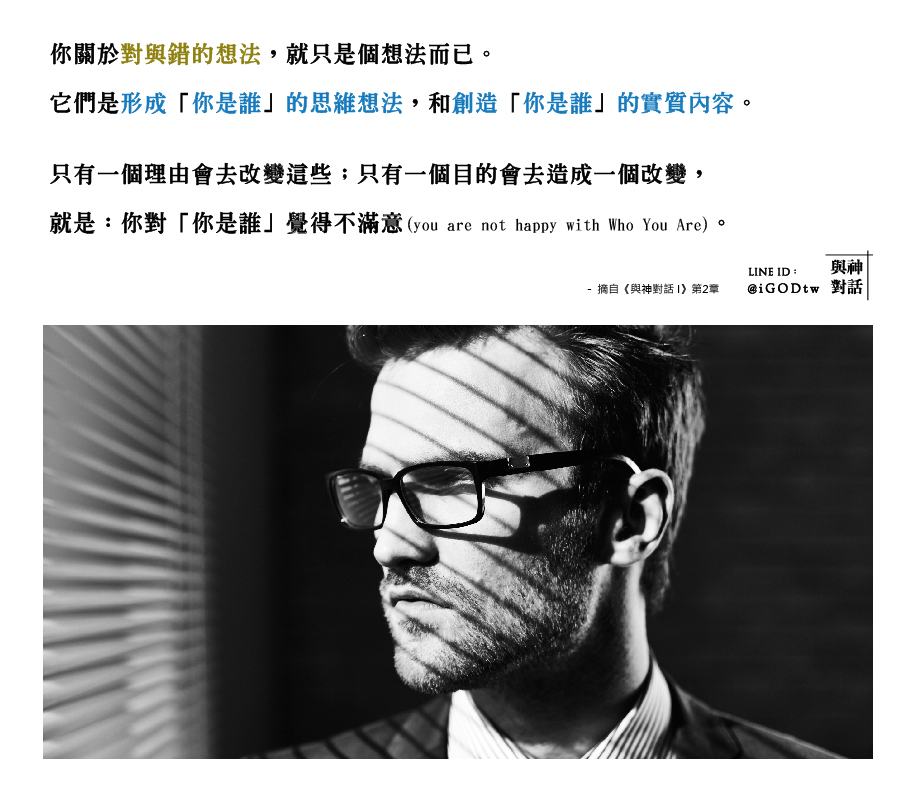
人類真的可以「跨越思言行」地體驗和創造自己的生活與人生嗎?什麼是being?如何跨出自己頭腦框架地覺察和「體驗應用being的創造」,此篇對話中神指出了最核心的關鍵,是一個最佳方法的好例子。
大道至簡。是大道就不會太難懂。難懂是因為意識的侷限,一旦意識擴展便能覺知。意識擴展的關鍵祕訣之一,在於放下頭腦、常往內心(而非往外)探索——也就是停止對外的抱怨或批判,而問自己(不是問任何外在的人或神佛):「我是誰? 我要成為怎樣的人? 難道這樣是我之所是嗎? 哪些是我的了解不夠之處? 什麼是我能做出的更高選擇?」
【改變「思言行」的秘訣:改變「你是誰」】
惡是「你們稱為惡」的東西。然而即使是那我也愛,因為,只有透過你們稱為惡的東西,你們才能認識「善」;只有透過你們稱為「魔鬼的工作」的事,你們才能認識並且去做「神的工作」。我愛熱並不比我愛冷更多,愛高不比愛低更多,愛左不比愛右更多。這全都是相對的。全都是本然的一部分。
我並不愛「好的」比我愛「壞的」更多。希特勒也上了天堂。當你了解這一點,你將了解神。
尼爾:但我一直被教育成會相信「在神的眼裡,好與壞是真的存在的;對與錯是相反的;而有些事是不可以、不對、不能接受的」。
在神的眼裡每件事都「可以接受」。因為神怎麼會不接受本然所是(For how can God not accept that which is?)? 排斥一樣東西就是否認它的存在。說它不可接受,就是說它不是我(神)的一部分——而那是不可能的。
然而保持你的信念,並忠於你的價值,因為這些是你父母以及你父母的父母的價值;是你朋友以及你社會的價值。它們形成了你生活的結構,失去它們會拆散你經驗的結構。 儘管如此,還是要一一地細查它們。一件件地檢視它們。不是要拆房子,是要檢視每一塊磚,並且換掉那些看來殘破而不能支撐結構的部分。
你關於對與錯的想法,就只是個想法而已。它們是形成「你是誰」的思維想法,和創造「你是誰」的實質內容(They are the thoughts which form the shape and create the substance of Who You Are.)。只有一個原因會去改變這些;只有一個目的會去造成一個改變,就是:如果你對「你是誰」覺得不滿意(There would be only one reason to change any of these; only one purpose in making an alteration: if you are not happy with Who You Are)。

只有你能知道你是否「覺得滿意」。只有你能對你的人生說——「這是我的創造(愛子),對它我很滿意。」(“This is my creation (son), in which I am well pleased.”,意思是:任何外人,既使是神,都難以對你說你對「你的創造」是否覺得滿意。)
如果你的價值對你有用、有幫助(If your values serve you),保有它們。為它們辯論。為辯護它們而戰。
然而,尋求一種不會傷害任何人的方式奮戰。傷害並非治癒的一個必要成分(Harm is not a necessary ingredient in healing.)。
摘自《與神對話 I》第2章

Evil is that which you call evil. Yet even that I love, for it is only through that which you call evil that you can know good; only through that which you call the work of the devil that you can know and do the work of God. I do not love hot more than I love cold, high more than low, left more than right. It is all relative. It is all part of what is.
I do not love “good” more than I love “bad.” Hitler went to heaven. When you understand this, you will understand God.
Neale: But I have been raised to believe that good and bad do exist; that right and wrong are opposed; that some things are not okay, not alright, not acceptable in the sight of God.
Everything is “acceptable” in the sight of God, for how can God not accept that which is? To reject a thing is to deny that it exists. To say that it is not okay is to say that it is not a part of Me—and that is impossible.
Yet hold to your beliefs, and stay true to your values, for these are the values of your parents, of your parents’ parents; of your friends and of your society. They form the structure of your life, and to lose them would be to unravel the fabric of your experience. Still, examine them one by one. Review them piece by piece. Do not dismantle the house, but look at each brick, and replace those which appear broken, which no longer support the structure.
Your ideas about right and wrong are just that—ideas. They are the thoughts which form the shape and create the substance of Who You Are. There would be only one reason to change any of these; only one purpose in making an alteration: if you are not happy with Who You Are.
Only you can know if you are happy. Only you can say of your life—”This is my creation (son), in which I am well pleased.”
If your values serve you, hold to them. Argue for them. Fight to defend them.
Yet seek to fight in a way which harms no one. Harm is not a necessary ingredient in healing.

